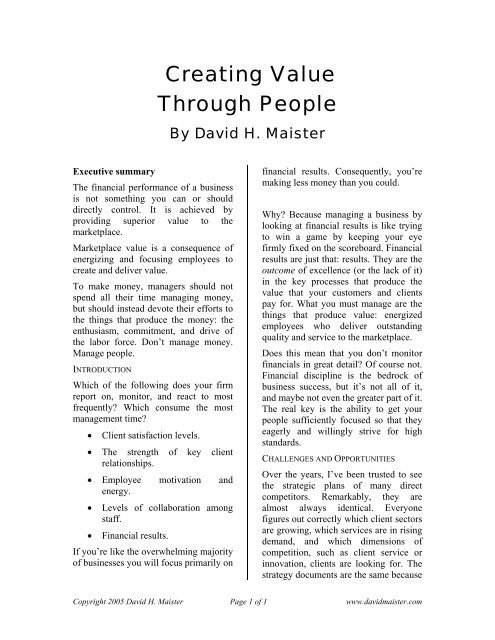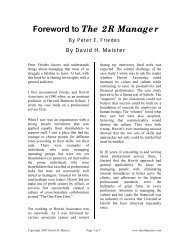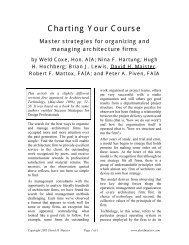pdf version - David Maister
pdf version - David Maister
pdf version - David Maister
Create successful ePaper yourself
Turn your PDF publications into a flip-book with our unique Google optimized e-Paper software.
Creating Value<br />
Through People<br />
By <strong>David</strong> H. <strong>Maister</strong><br />
Executive summary<br />
The financial performance of a business<br />
is not something you can or should<br />
directly control. It is achieved by<br />
providing superior value to the<br />
marketplace.<br />
Marketplace value is a consequence of<br />
energizing and focusing employees to<br />
create and deliver value.<br />
To make money, managers should not<br />
spend all their time managing money,<br />
but should instead devote their efforts to<br />
the things that produce the money: the<br />
enthusiasm, commitment, and drive of<br />
the labor force. Don’t manage money.<br />
Manage people.<br />
INTRODUCTION<br />
Which of the following does your firm<br />
report on, monitor, and react to most<br />
frequently? Which consume the most<br />
management time?<br />
• Client satisfaction levels.<br />
• The strength of key client<br />
relationships.<br />
• Employee motivation and<br />
energy.<br />
• Levels of collaboration among<br />
staff.<br />
• Financial results.<br />
If you’re like the overwhelming majority<br />
of businesses you will focus primarily on<br />
financial results. Consequently, you’re<br />
making less money than you could.<br />
Why? Because managing a business by<br />
looking at financial results is like trying<br />
to win a game by keeping your eye<br />
firmly fixed on the scoreboard. Financial<br />
results are just that: results. They are the<br />
outcome of excellence (or the lack of it)<br />
in the key processes that produce the<br />
value that your customers and clients<br />
pay for. What you must manage are the<br />
things that produce value: energized<br />
employees who deliver outstanding<br />
quality and service to the marketplace.<br />
Does this mean that you don’t monitor<br />
financials in great detail? Of course not.<br />
Financial discipline is the bedrock of<br />
business success, but it’s not all of it,<br />
and maybe not even the greater part of it.<br />
The real key is the ability to get your<br />
people sufficiently focused so that they<br />
eagerly and willingly strive for high<br />
standards.<br />
CHALLENGES AND OPPORTUNITIES<br />
Over the years, I’ve been trusted to see<br />
the strategic plans of many direct<br />
competitors. Remarkably, they are<br />
almost always identical. Everyone<br />
figures out correctly which client sectors<br />
are growing, which services are in rising<br />
demand, and which dimensions of<br />
competition, such as client service or<br />
innovation, clients are looking for. The<br />
strategy documents are the same because<br />
Copyright 2005 <strong>David</strong> H. <strong>Maister</strong> Page 1 of 1 www.davidmaister.com
Creating Value Through People<br />
everyone’s smart! Everyone knows what<br />
needs to be done.<br />
If this is so, then what is competition<br />
really about? It’s about who can best<br />
complete the work that needs to get<br />
done. And this in turn is determined by<br />
the following set of closely related<br />
concepts:<br />
• energy<br />
• drive<br />
• enthusiasm<br />
• excitement<br />
• commitment<br />
• passion<br />
• ambition<br />
Where these exist the discipline can be<br />
found to engage in diligent execution<br />
and thereby outperform the competition.<br />
The role of the manager is to be a net<br />
creator of enthusiasm, excitement,<br />
passion, and ambition. Alas, all too often<br />
managers are destroyers of excitement.<br />
If all they ever talk about is finances<br />
(How are your billings? What’s<br />
happening to receivables?), it can deaden<br />
the spirit.<br />
That doesn’t mean they don’t need to<br />
talk about these things—they do. But<br />
they shouldn’t talk only about these<br />
things. It’s the manager’s job to inspire,<br />
cajole, exhort, nag, support, critique,<br />
praise, encourage, confront, and comfort,<br />
as individual people (and groups of<br />
people) struggle to live their work lives<br />
according to high standards.<br />
All strategies, at some time or the other,<br />
involve a tradeoff between short-term<br />
cash and executing the strategy. If<br />
you’re going to get the benefits of a<br />
strategy, you need to be willing to make<br />
hard choices and act as if you truly<br />
believe it. You must be willing to<br />
practice what you preach, both when it’s<br />
convenient and, most important, when it<br />
is not.<br />
Many people don’t believe that their<br />
leaders truly want them to act<br />
strategically. Whenever a choice needs<br />
to be made between strategy and shortterm<br />
cash—and it always does—most<br />
people feel under significant, if not<br />
irresistible, pressure from management<br />
to go for the cash. Usually the message<br />
from the firm’s leadership is clear:<br />
strategy can wait for tomorrow (if we<br />
can get paid for competence, why strive<br />
for excellence?). Rather than leaders<br />
being a source of encouragement to<br />
execute the strategy, they’re all too often<br />
the biggest obstacles to the<br />
implementation of strategy.<br />
If you want to be known as excellent at<br />
something, you have to be reliably,<br />
consistently excellent at it. Business life<br />
is filled with daily temptations, shortterm<br />
expediencies, and wonderful<br />
excuses for why we can’t afford to stick<br />
to high standards today. We take in work<br />
that’s off-strategy (after all, it’s cash!),<br />
we defer training until some more<br />
convenient time (often never), we<br />
postpone investments until the everescalating<br />
profit goals are met, and the<br />
marketing principle is: we never met a<br />
dollar of revenue we didn’t like!<br />
There is nothing inherently wrong about<br />
making these choices, but you shouldn’t<br />
fool yourself. If you’re willing to<br />
sacrifice value to earn short-term cash,<br />
you won’t create a market reputation for<br />
superior quality. It takes courage to<br />
believe that a reputation for excellence is<br />
worth more in the long run than<br />
incremental cash. In their vision,<br />
mission, and strategy documents, firms<br />
Copyright 2005 <strong>David</strong> H. <strong>Maister</strong> Page 2 of 2 www.davidmaister.com
Creating Value Through People<br />
say that they are aiming for excellence,<br />
but that’s not how they operate.<br />
Managers must have the courage of the<br />
convictions they espouse, maintain a<br />
long-term focus, and intervene<br />
personally whenever there are departures<br />
from the values and vision that create<br />
excellence. The problem with the<br />
implementation of strategies is the<br />
absence of certain and recognizable<br />
consequences for noncompliance. If the<br />
manager doesn’t have the courage to<br />
tackle individuals who aren’t behaving<br />
in accordance with the strategy, others<br />
will quickly realize that the new strategy<br />
is not something they have to do. They’ll<br />
quickly cease striving to comply, and the<br />
benefits of the strategy will never be<br />
attained.<br />
Great managers give their people<br />
individually and collectively the<br />
confidence that greater success,<br />
fulfillment, accomplishment, and profits<br />
are indeed attainable. They give their<br />
people the courage to try. Change is<br />
threatening, however, and many, if not<br />
most, people operate well within their<br />
comfort zone, reluctant to abandon the<br />
old habits that brought them to their<br />
current success. If managers are often<br />
demanding, they must also be<br />
supportive. They must manage with a<br />
positive, supportive style.<br />
Just as management involves a delicate<br />
balance between being supportive and<br />
being demanding, it also requires a style<br />
of insistent patience; it’s the difference<br />
between saying Rome wasn’t built in a<br />
day and insisting that we are building<br />
Rome. People must believe that the<br />
manager has the courage to believe in<br />
something and, more important, will<br />
stick with it. There’s no greater<br />
condemnation of managers than to say<br />
that they’re expedient, and no greater<br />
commendation than to say that a<br />
manager truly lives and acts in<br />
accordance with what he or she<br />
practices.<br />
BEING EFFECTIVE—AND SUCCESSFUL<br />
An effective manager must be:<br />
• articulate and vocal about his or<br />
her personal beliefs;<br />
• disciplined about standards;<br />
• even-handed and even-tempered;<br />
• genuine and sincere;<br />
• able to read people’s characters<br />
and skill levels effectively;<br />
• honorable, with high integrity.<br />
What do the most successful managers<br />
believe?<br />
• First you build your people, and<br />
the rest will come.<br />
• Fun and discipline combined get<br />
the job done.<br />
• It’s important how people treat<br />
each other; monitor it and<br />
manage it.<br />
• People have to trust management<br />
and trust each other.<br />
• Success is about character,<br />
respect, integrity, trust, honesty,<br />
empowerment, confidence,<br />
loyalty, and keeping promises.<br />
• You must bet on the long term<br />
and not get stampeded by shortterm<br />
pressures.<br />
• You need to balance your focus<br />
on people, clients, and finances.<br />
• You should live up to your<br />
values every day.<br />
• Your agenda as a manager is to<br />
create a great place to work, not<br />
Copyright 2005 <strong>David</strong> H. <strong>Maister</strong> Page 3 of 3 www.davidmaister.com
Creating Value Through People<br />
to work at making your own star<br />
rise.<br />
Finally, here are the rules on which the<br />
most successful managers model their<br />
behavior:<br />
• Act as if not trying is the only<br />
sin.<br />
• Act as if you want everyone to<br />
succeed.<br />
• Actively help people with their<br />
personal development.<br />
• Always do what you say you are<br />
going to do.<br />
• Do what’s right over the long<br />
term for clients and for your<br />
people.<br />
• Don’t regard yourself as separate<br />
and distinct from your people.<br />
• Facilitate, don’t dictate.<br />
• Let people know you as a human<br />
being, not just as their manager.<br />
• Show enthusiasm and drive;<br />
they’re infectious and addictive.<br />
• Speak regularly about your<br />
vision and philosophy so that<br />
people know where you stand.<br />
• Take work seriously, but don’t<br />
take yourself seriously.<br />
• Understand what drives<br />
individuals.<br />
• Know all your people as<br />
individuals.<br />
MAKING IT HAPPEN<br />
To get started, take out the documents<br />
that describe your company’s mission,<br />
vision, values, and strategy. Turn them<br />
into a questionnaire and ask your people<br />
how well they think you’re currently<br />
living up to the things you espouse.<br />
If you find out that there are some things<br />
that you’re not doing so well, either fix<br />
them or drop them from your<br />
declarations: there’s no point lying,<br />
pretending to advocate things you’re not<br />
willing to live up to. Practice what you<br />
preach! Make it the short-term<br />
immediate priority to make the firm live<br />
up to its overarching vision.<br />
Another vital step is to involve as many<br />
people as possible in the process of<br />
implementing, if not actually setting,<br />
strategy. The task of energizing,<br />
mobilizing, and motivating action is<br />
easier with people feeling involved,<br />
rather than being imposed on from<br />
above.<br />
CONCLUSION<br />
A person doesn’t build a business. A<br />
person builds an organization that builds<br />
a business. Many managers are<br />
appointed because of their financial<br />
skills, their business development skills,<br />
or their technical excellence. However,<br />
there comes a point where the central<br />
question is, Can you manage? Are you a<br />
net creator of energy, drive, and<br />
ambition in others? Can you cause others<br />
to strive to achieve high standards?<br />
Published in BUSINESS: The Ultimate<br />
Resource, Perseus Publishing 2002.<br />
Copyright 2005 <strong>David</strong> H. <strong>Maister</strong> Page 4 of 4 www.davidmaister.com
Creating Value Through People<br />
<strong>David</strong> <strong>Maister</strong> is the author of Managing<br />
the Professional Service Firm (1993),<br />
True Professionalism (1997), The<br />
Trusted Advisor (2000) (coauthor),<br />
Practice What You Preach (2001) and<br />
First Among Equals (2002) (coauthor.)<br />
Prior to launching his (solo but global)<br />
consulting practice in 1985, he served as<br />
a professor at the Harvard Business<br />
School.<br />
TEL: 1-617-262-5968<br />
E-MAIL: david@davidmaister.com<br />
WEBSITE: www.davidmaister.com<br />
You can automatically receive <strong>David</strong>’s<br />
future articles via e-mail (at no cost) by<br />
registering on his web site<br />
(www.davidmaister.com).<br />
Copyright 2005 <strong>David</strong> H. <strong>Maister</strong> Page 5 of 5 www.davidmaister.com











